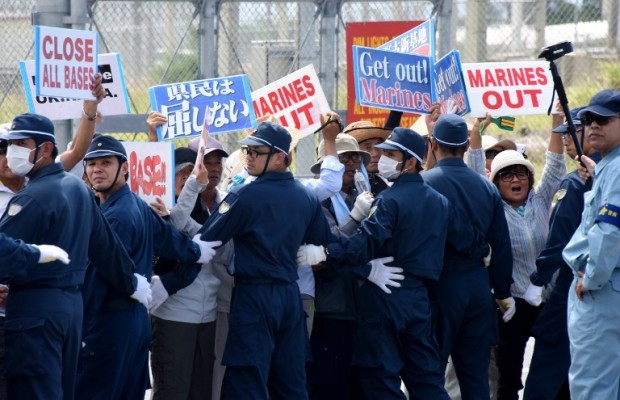Japanese protesters rally against US military on Okinawa

Policemen (in blue) try to remove people protesting against the presence of US bases, in front of the gate of the US Marine Corps’ Camp Schwab in Nago on the southern island of Okinawa prefecture on June 17, 2016. / AFP PHOTO / TORU YAMANAKA
NAHA, Japan — Thousands of demonstrators rallied on the Japanese island of Okinawa on Sunday against the heavy US military presence and violent crimes by American personnel that have angered residents for decades.
Protesters, whom organizers expected to number more than 50,000, gathered in the prefectural capital Naha, infuriated with the United States after a former Marine employed as a civilian base worker allegedly raped and murdered a young local woman in April.
The case has intensified longstanding opposition to the bases — a key part of the US-Japan security alliance — on the sub-tropical southern outpost, a popular holiday destination for Japanese and, increasingly, China and other Asian countries.
The demonstration, held at an athletics park under scorching heat with many in attendance shielding themselves under umbrellas, began with a moment of silence for 20-year-old Rina Shimabukuro, the murder victim, and a message from her father.
“Why my daughter, why was she killed,” said the message, read on his behalf. “My thoughts are the same as those of all the bereaved families that have met with suffering up to now.”
Article continues after this advertisementSome in the crowd, the size of which could not immediately be confirmed, held signs in Japanese reading, “Our anger is past its limit,” and “Pull out the Marines.”
Article continues after this advertisement“I’m filled with sadness and I really don’t want any more victims,” said participant Chihiro Uchimura, 71.
“As long as there are US military bases this kind of incident will continue to happen,” she said.
A similar demonstration was being held simultaneously outside the Japanese parliament in Tokyo.
Protesters also want the scrapping of plans by Washington and Tokyo to move a major US Marine facility in the center of the island to pristine waters off the northern coast.
‘Military colony’
Okinawa’s governor Takeshi Onaga, who is attending the rally, opposes the plan and instead wants Marine Corps Air Station Futenma, which sits in the middle of a crowded city, moved off the island altogether.
He has revoked approval for work on the facility, though Washington and Tokyo vow to push forward.
The idea to move the base was sparked by the 1995 rape by three American personnel of a 12-year-old girl and though the project was set to have been completed years ago it remains held up by local opposition and legal maneuvering.
“Japan is still a military colony of the United States,” said teacher Noboru Kitano, 59, standing at an observation point overlooking the Futenma base, widely seen as a danger to nearby residents.
“This base symbolizes that.”
The roots of the presence go back to the end of World War II when Okinawa was the site of a battle between Japan and the US, followed by a 27-year American occupation.
High-profile crimes have sparked large-scale protest rallies before on Okinawa, now considered a strategic linchpin supporting the US-Japan alliance, but where pacifist sentiment runs high.
In 1995, tens of thousands rallied following the rape of the girl, which prompted Washington to pledge to reduce the US footprint on the fortified island. Nearly 100,000 people joined a protest in 2010 against the construction of the new base off the northern coast.
US officials have grown increasingly concerned that the behavior of its troops on the island could jeopardize support among Japanese for the security relationship and have imposed restrictions including on off-base alcohol consumption after an intoxicated sailor injured two locals while driving this month.
President Barack Obama received the equivalent of a diplomatic tongue-lashing over the death of the 20-year-old woman from Prime Minister Shinzo Abe during a visit to Japan last month.
Obama called it a “tragedy” and expressed “deepest regrets” at a joint press conference./rga
RELATED STORIES
US to hasten return of Okinawa military-held land to Japan